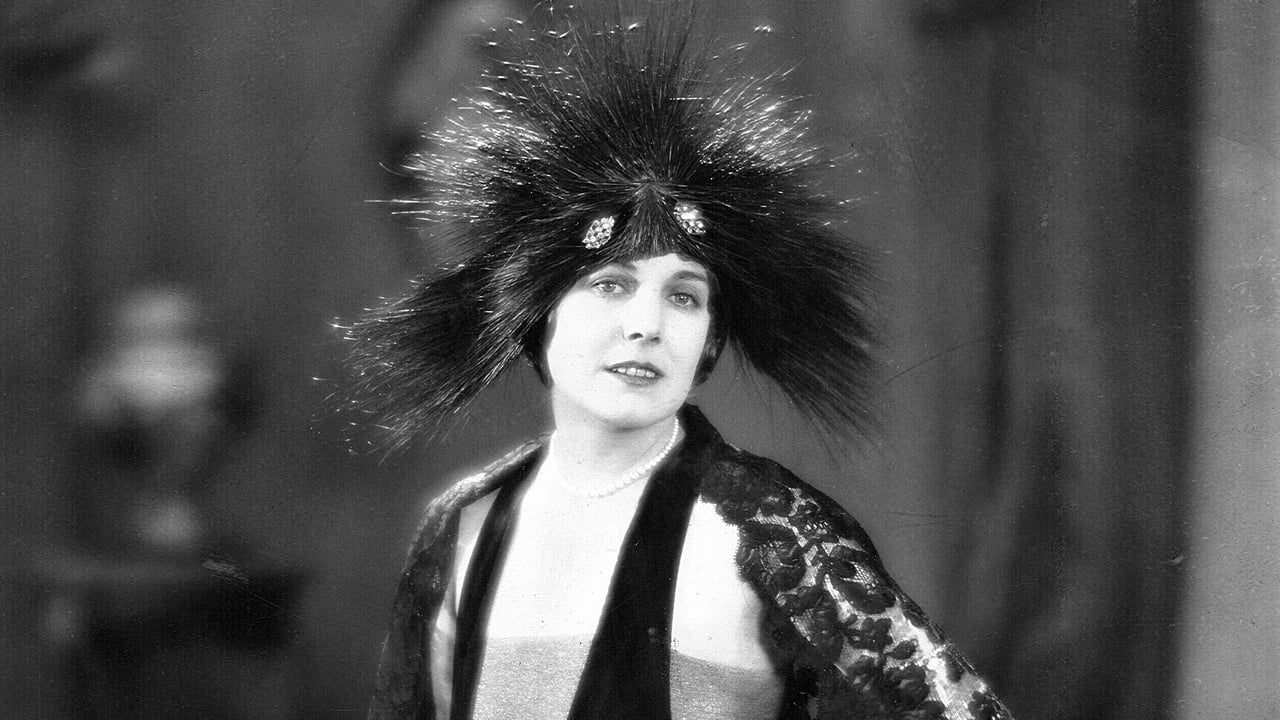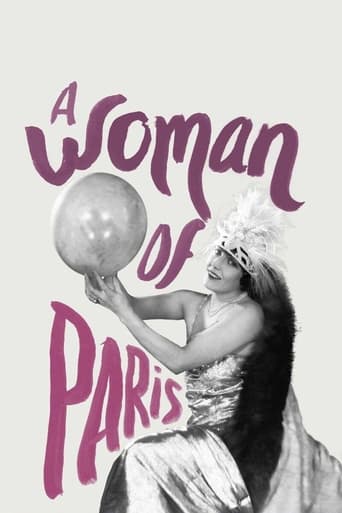



Purely Joyful Movie!
I have absolutely never seen anything like this movie before. You have to see this movie.
View MoreA film of deceptively outspoken contemporary relevance, this is cinema at its most alert, alarming and alive.
View MoreThis movie tries so hard to be funny, yet it falls flat every time. Just another example of recycled ideas repackaged with women in an attempt to appeal to a certain audience.
View MoreThis charming film easily proves that Charlie Chaplin could do serious drama if only the public would have allowed him.TCM announcer Ben Manciewicz notes that "A Woman of Paris" bombed at the box office but that couldn't have been due to the performances, which were uniformly wonderful.Edna Purviance seems an unlikely heroine -- not dazzlingly gorgeous but convincingly expressive as a woman who'd like to give herself to a troubled artist who lacks the backbone to stand up to his mother and commit.Carl Miller does well as the conflicted painter but Adolphe Menjou is wonderful as a shallow bon vivant who is more entertained by than enamored with the lovely Marie.Lydia Knott is very good in the unglamorous role of Jean's doting mother.I liked the way this film ended on an inspiring note by citing the redemptive value of giving to others -- an ageless message.Coda: Music is used to wonderful effect in this film, as in sequences in which Pierre picks up a miniature saxophone and gives it a tootle. Impressively, it was Chaplin who composed the score.
View More1923's "A Woman of Paris is probably not what you'd expect in a Chaplin film based on the totality of his body of work, both in features and in shorts. However, that doesn't mean it's not worthwhile viewing. It just means if you are new to Chaplin, you might not want to start here."A Woman of Paris" showed Chaplin's talent behind the camera without him appearing in front of it, except for a lone cameo in which he quickly appears and then disappears acting as a luggage boy. He made it for two reasons, to do some pioneering in cinematic technique and to help give his long time costar and companion Edna Purviance a career boost. The film is actually quite good with great performances by Purviance and by Adolphe Menjou as a carefree playboy. The film did make a star out of Menjou. It didn't really help Purviance that much. The film is about a pair of star-crossed lovers that circumstance drives apart and then brings back together and the eventual tragedy that occurs due to the weakness of will of Purviance's character's one time fiancé, played by Carl Miller.The film was a failure at the box office, not because it was bad, but because audiences expected to see Chaplin when they went to a Chaplin film. After the failure of this film, Chaplin went back to formulas that were tried and true for him and never really went out on a limb experimenting again, which is too bad for all of us.
View MoreA Woman of Paris is probably best known, ironically, by the fact that it is a Chaplin film that Chaplin does not appear in. It opens with a title card in which Chaplin himself wishes to clear up any misunderstanding by mentioning that he does not appear in the film, but my understanding is that it was a popular and critical failure at the time of its release. He does appear in the film, but walks on and off screen so fast and looks so little like himself that there is really no reason for him to be there. The film's popular failure seems to have been something that plagued him through the rest of his career, since he returned to the film and re-scored it at the age of 87. It was the last work he ever did as a filmmaker, and the result was that people finally recognized the film for the master work that it is. We meet a young woman whose father keeps her in the house under lock and key, but who nevertheless escapes at night to visit her lover, whom she plans to marry. One night, her father sees her leaving, and then locks her out. He then proceeds over-react to the point where he won't allow her in the house, so she is forced to try to go find a place to stay at her boyfriend's house. It is a curious illustration of 1920s society that his parents want to kick her out of the house as though she were a diseased rodent. They are committing an unpardonable sin by being together at night outside of marriage. It's easy to sympathize with their desperate situation.Soon, tragedy strikes, which leads to a tragic misunderstanding which, I have to say, is not presented very well in the movie. This is, however, probably the film's only weak point. I had to wonder why this even allowed for a level of misunderstanding that enabled her to move to Paris and join high society without ever talking to the man for long enough for him to explain what happened. It's also a little strange that they both appear to be in their mid-30s or so and are yet not only unmarried but still live with their parents. Nevertheless, she joins a wealthy social circle and becomes involved in their wealthy and loveless life, surrounded by rich people in constant leisure, smoking cigars, drinking champagne, and eating truffles ("a delicacy for pigs and gentlemen "). It is inevitable that they will meet again at some point, and when they do, time has, indeed, made strangers of them, but his love is still alive. He has become an accomplished artist and she hires him to paint her portrait, which again intertwines their lives.It is interesting that he is still mourning the death of his father, even years later. But he comes from a world where relationships are extremely important, whether romantic or family, and she, on the other hand, has entered a world of money where relationships are startlingly meaningless. She drags her feet at talking about the history between them, saying that she doesn't want to dig up the past, while he interestingly looks directly at the camera and explains that he is still badly hurt by what has happened.Soon, she is forced to choose between a life of love or a life of luxury, and it is notable that the rich man that she was in a "relationship" is pointedly indifferent when she leaves him, explaining that he'll never see her again. "Okay, phone me sometime," he says as he casually walks out the door, leaving her to do as she will. Soon, things seem to be looking up for their mutual happiness, but another tragic misunderstanding (or at least badly timed conversation), throws everything into chaos again. When she leaves, Jean, her boyfriend, becomes desperate.The ending of the film is deeply symbolic, and involved a long road, like the ending of some of Chaplin's better known short comedies. The film's message, that time heals and the secret of happiness is in service to others, doesn't need to be delivered as directly as it is, but it also doesn't hurt the movie that this happens. It's a deeply moving story that illustrates an unfortunate aspect of a certain level of society, a level about which Chaplin was certainly no stranger. It is definitely, as the title says, a drama of fate, and makes a strong comment about what is important in life. It's interesting to consider Chaplin's personal life at the time that the movie was made, but I think it's more important to let the film stand on it's own. This is a brilliant piece of film-making.
View MorePreviously my picture of Mr Charlie Chaplin in my mind's eye had been the following: a tiny clownish fellow who kicks other actors in the ass and gets thrashed and kicked in reply. In the course of time my perception changed. His music was playing as the background for the movies he participated in. Surprise. It was not Mozart but the clown himself. Now there is this film and it's definitely cinematic art. So many present-day directors cannot reach even 1/100th of the effect that is achieved by this black-and-white film that is even mute. It has no fountains of blood, no slo-mo, no bullets hitting foreheads, no explosions, no sex scenes, no *beep* words, no crude toilet humour, no trash-talk, no flat melodramatic elements, no crocodile tears, no stupid laughs. What more should a viewer want? The bitter irony and drama are scattered here and there. Its quality can be compared to the quality of the famous "Jeeves and Wooster" before it hit the appalling cast changes (hope, you know what is meant here).Here goes mine 10.Thank you for attention.
View More